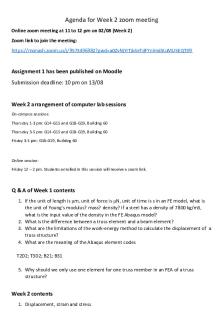SOC100r6 wk2 worksheet PDF

| Title | SOC100r6 wk2 worksheet |
|---|---|
| Author | Esthepania Galvan |
| Course | Introduction To Sociology |
| Institution | University of Phoenix |
| Pages | 2 |
| File Size | 82.7 KB |
| File Type | |
| Total Downloads | 38 |
| Total Views | 139 |
Summary
Download SOC100r6 wk2 worksheet PDF
Description
Socialization and Social Structure Worksheet SOC/100 Version 6
1
University of Phoenix Material Socialization and Social Structure Worksheet
Short-Answer Respond to the following in 50 to 75 words each, unless otherwise specified. 1. In 25 to 50 words each, describe the following perspectives of development of the self: a. Cooley’s Looking Glass Self: The looking glass self contains three elements, we imagine how we appear to others, those around us. Grumpy, very serious, or with a good sense of humor. We interpret how those around us react, we conclude how others react around us. Do they like us? do they dislike us? We develop a self concept, a favorable reaction of others leads to a positive self concept.
b. Mead’s Role Taking: What I understood from this concept is what we were taught to do at very early ages, our favorite game, pretending to be somebody else. We learn to put ourselves is someone elses’s shoes. It includes three stages: imitation, under the age of 3. Play, the second stage, from age 3 to 6. And lastly, team games, school age. We learn to predict how a person will react and accomotade our behavior accordingly.
c.
Piaget’s Development of Reasoning: This is how we learn to reason, this process has four stages: sensorimotor stage, directed to touch, sucking, listening, looking. Preoperational stage, developed ability to use symbols. At this point we still do not know what numbers mean. Concrete stage our reasoning abilities are more developed now, we are able to understand numbers, size, speed, or acusation. We are able to take the role of the other. The formal operational stage allows us to be capable of abstract thinking, we can talk about concepts, come to conclusions based on general principles.
2. What role does socialization take in personality, morality, emotions, and gender? How do different agents of socialization contribute? I believe socialization’s duty is to helps us fit in to a certain group in society. We shape our personality to fit in. Morality is almost a natural instinct, some moral values are with us since we are born, we are able to learn what is right from wrong. Society over the course of years, has established six main emotions, anger, disgust, fear, happiness, sadness and surprise. Gender, sets the path for us because we are male or female.
3. In 20 to 25 words each, describe how socialization occurs in each of the following developmental periods: a. Childhood (birth to age 12): During this age children learn from role models, mother, father, grandparents, siblings. It varies from culture to culture.
b. Adolescence (ages 13-17): A social invention, not a natural age division. It occurs in school, this is the time when we learn to define or find ourselves.
c.
Transitional Adulthood (ages 18-29): This happens right after highschool, Slowly learning how to support themselves while continuing to find out who they really are.
Copyright © 2018 by University of Phoenix. All rights reserved.
Socialization and Social Structure Worksheet SOC/100 Version 6
2
d. The Middle Years (ages 30-65): Have established goals in life, special challenges are set, especially for women. And at later years, we compare what we have achieved to what we had planned.
e. The Older Years (ages 65 and above): During this age we tend to isolate ourselves due to our declined health and mobility. Which is only more detrimental to our physical and mental health.
4. Different societies have different social structures. What is social structure? What components contribute to the macrosociological perspective of social structure? Social structure is the framework of society that surrounds us, consists of the ways that people and groups are related to one another, it gives direction to and sets limits on our behavior. Macrosociological focuses on broad features of society such as social class, and how groups are related to each other, status, job skills, education.
Copyright © 2018 by University of Phoenix. All rights reserved....
Similar Free PDFs

SOC100r6 wk2 worksheet
- 2 Pages

WK2 Aufgabenskript WK2 K11
- 4 Pages

WK2 Q1
- 2 Pages

Ethics wk2 - qqqqqqq
- 31 Pages

Quiz Wk2 Revision
- 3 Pages

Wk2 zoom meeting agenda
- 2 Pages

ME2540 WK2 Assignment
- 4 Pages

T2 - wk2 tut problem
- 2 Pages

WK2- Tutorial questions
- 10 Pages

WK2 Skript 02 Eisenbasis 2
- 32 Pages

WK2 Skript 03 Eisenbasis 3
- 20 Pages

Music Melody and Rhythm WK2
- 2 Pages

ECON WA WK2 - Grade: B+
- 3 Pages
Popular Institutions
- Tinajero National High School - Annex
- Politeknik Caltex Riau
- Yokohama City University
- SGT University
- University of Al-Qadisiyah
- Divine Word College of Vigan
- Techniek College Rotterdam
- Universidade de Santiago
- Universiti Teknologi MARA Cawangan Johor Kampus Pasir Gudang
- Poltekkes Kemenkes Yogyakarta
- Baguio City National High School
- Colegio san marcos
- preparatoria uno
- Centro de Bachillerato Tecnológico Industrial y de Servicios No. 107
- Dalian Maritime University
- Quang Trung Secondary School
- Colegio Tecnológico en Informática
- Corporación Regional de Educación Superior
- Grupo CEDVA
- Dar Al Uloom University
- Centro de Estudios Preuniversitarios de la Universidad Nacional de Ingeniería
- 上智大学
- Aakash International School, Nuna Majara
- San Felipe Neri Catholic School
- Kang Chiao International School - New Taipei City
- Misamis Occidental National High School
- Institución Educativa Escuela Normal Juan Ladrilleros
- Kolehiyo ng Pantukan
- Batanes State College
- Instituto Continental
- Sekolah Menengah Kejuruan Kesehatan Kaltara (Tarakan)
- Colegio de La Inmaculada Concepcion - Cebu


